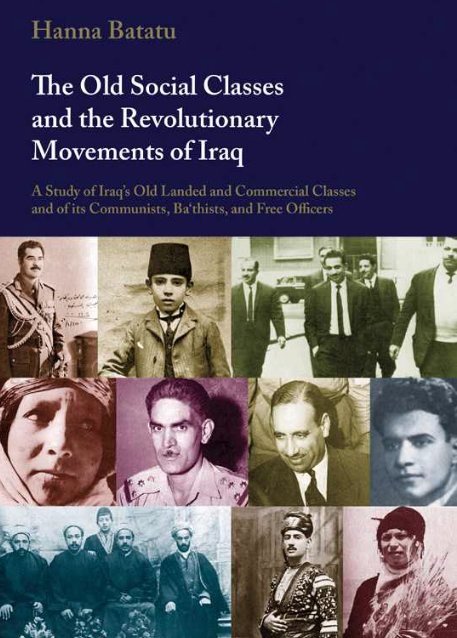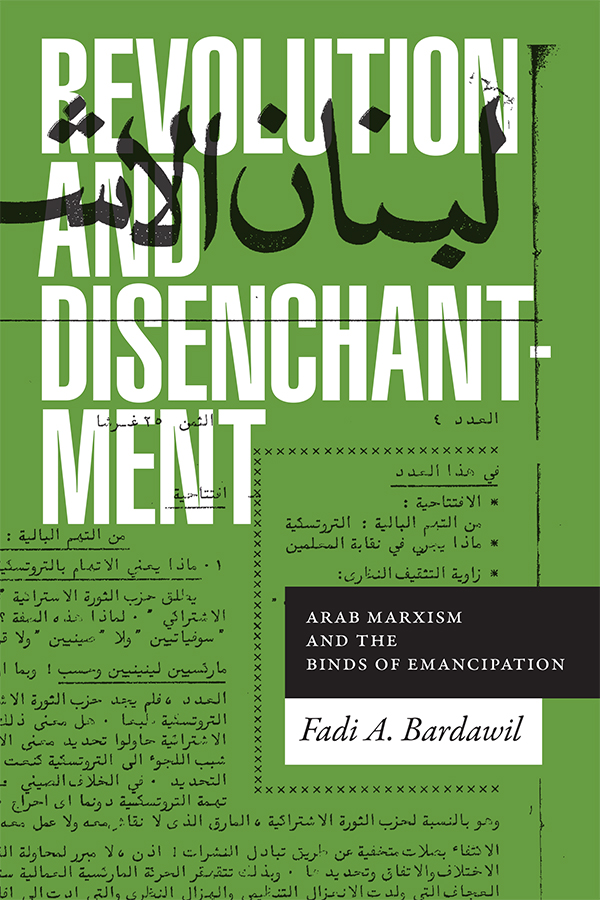As`ad AbuKhalil reviews Fadi Bardawil’s new book, “Revolution and Disenchantment: Arab Marxism and the Binds of Emancipation.”
By As`ad AbuKhalil
Special to Consortium News
 There is a need for Western studies of the left in the Arab world. Hanna Batatu in his book “The Old Social Classes and the Revolutionary Movements of Iraq” on Iraqi communists and Ba`thists, in 1978, may have been a pioneering attempt to dispel Western misconceptions about Arab political culture — that communism or leftism never made inroads in the region.
There is a need for Western studies of the left in the Arab world. Hanna Batatu in his book “The Old Social Classes and the Revolutionary Movements of Iraq” on Iraqi communists and Ba`thists, in 1978, may have been a pioneering attempt to dispel Western misconceptions about Arab political culture — that communism or leftism never made inroads in the region.
Several Western books have dealt with the Arab left and communism in the region (especially in Palestine and Egypt) but much about the subject is still shrouded in mystery. There is more literature about Arab communism and socialism in Arabic but much of it is written by their opponents. Gulf regimes and the U.S. funded anti-communist literature for the entire duration of the Cold War.
 Until the late 1970s, Lebanon had a very vibrant leftist movement and communist parties proliferated, ranging from the revolutionary left to mainstream orthodox communism, namely the Lebanese Communist Party and the Communist Action Organization.
Until the late 1970s, Lebanon had a very vibrant leftist movement and communist parties proliferated, ranging from the revolutionary left to mainstream orthodox communism, namely the Lebanese Communist Party and the Communist Action Organization.
Lebanon still has communist organizations but the rise of religious movements following the Iranian revolution, and the Saudi propagation of religious militancy in the wake of the 1979 uprising in the Grand Mosque in Mecca, dealt a severe blow to the cause of the left.
That damage was intensified when the Soviet Union collapsed, especially given that most communist parties slavishly followed Soviet dictates. (The Popular Front for the Liberation of Palestine, for example, started as an independent Marxist organization attempting to chart a new Asian model of Marxism, but by 1972, it quickly joined the ranks of pro-Soviet Arab communist parties.)
One recent history of the Lebanese left was written from a conservative point of view and published in Arabic by the Rosa Luxemburg Foundation (which, despite its name, is involved in activities that fall within the agenda of non-progressive organizations like those funded by the George Soros or the National Endowment for Democracy.)
“The Lebanese Left,” by Husayn Ya`qub, was written from the perspective of individuals who split off from the communist movement in Lebanon to join the right-wing Hariri movement, and the March 14 coalition. The literature of former leftists who joined the ranks of the right is rather rich: from Europe to the U.S. In the Middle East, Gulf despots have funded accounts by former communists (starting with Qadri Qal`aji in the 1950s) who denounced their former parties.
‘Revolution & Disenchantment’
Now a new book by Fadi Bardawil, “Revolution and Disenchantment: Arab Marxism and the Binds of Emancipation,” just released by Duke University Press, falls within the same political lines.
Firstly, the title of the book is grossly misleading. This is not a history or anthropological study of Arab Marxism; this is actually a homage to a Lebanese right-winger, Waddah Shararah, who was a Marxist in his youth— from the early 1960s till the mid-1970s — and who has since devoted his life to attacking the left and anyone who engages in armed struggle against Western or Israeli occupation. (Even David Horowitz was once a far left radical but no one still treats him as a leftist).
 The author decides to ignore the decades that Shararah spent attacking the left and focuses instead on the brief period in his life when he was a leftist. Bardawil disingenuously does not tell the reader about his later career writing exclusively for right-wing publications and mouthpieces of royal princes and the Hariri family media.
The author decides to ignore the decades that Shararah spent attacking the left and focuses instead on the brief period in his life when he was a leftist. Bardawil disingenuously does not tell the reader about his later career writing exclusively for right-wing publications and mouthpieces of royal princes and the Hariri family media.
The author also dishonestly tries to reconcile the work of Shararah with that of Edward Said, of all people — perhaps he does that to ingratiate himself with progressive readers in Western academe who don’t know about Shararah.
Bardawil is also fascinated and in awe of people who betray the left; they are the featured heroes of this book. One of them is the late Syrian intellectual, Sadiq Jalal Al-Azm, who went from being a dogmatic Marxist who accused all those who disagreed with him of being Mossad or CIA agents (see his book “Ziayarat As-Sadat”), to a liberal working closely with the Syrian opposition in exile, which was sponsored by the Qatari and Saudi regimes.
Worse, Bardawil revives the 1967 work by Al-Azm, “Self-Critique After the Defeat,” which was a native racist regurgitation of the racism in “The Arab Mind,”authored by the Israeli Orientalist Raphael Patai.
Al-Azm basically argued that the Arabs lost the 1967 war due to failings in their personality. Thus the reconciliation that Bardawil forces between Said and Shararah extends to Said and Al-Azm despite their totally contradictory paradigms and their bitter feud. (In 1993, Al-Azm pressed me to ask Said to reconcile with him and Said adamantly refused and considered the political — not only personal — break between them irreparable).
Bardawil conveniently only mentions this rift in the endnotes. Yet, Bardawil wants the readers to believe that Said, Azm and Shararah all belong to the same camp. Edward Said would have shuddered at the artificial association.
The attempt to elevate Shararah (a favored voice in all right-wing anti-resistance Gulf media) into a Marxist icon is also contradicted by the very record of the man even during his leftist sojourn. He split off from every leftist organization he joined (which he would accuse of being not sufficiently leftist or revolutionary) and yet even during the brutal French war on Algeria, he expressed disgust for the struggle of FLN because he accused the movement of running the brothels of France (p. 52).
This is the man who resigned from the Communist Action Organization because it did not follow his advice to pursue a people’s liberation war (p. 132), but would later accuse anti-Israeli resistance groups as “terrorist.” How offensive to Arab Marxists and their personalities and martyrs that a book paying homage to this person, Shararah, carries the subtitle of “Arab Marxism and the Binds of Emancipation.”
The Neo-Left

U.S. President Herbert Walker Bush visiting troops in Saudi Arabia on Thanksgiving Day, 1990. (Wikimedia Commons)
The key to understanding this book, is to understand the neo-left which emerged right after the U.S. attack on Iraq in 1990, when Western and Arab (former) leftists advocated Western intervention in the affairs of developing countries in the name of liberation or higher cause. The Syrian war runs through the outlook of this author, and he (not sure why in a book on Arab Marxism) mocks the notion that Syrian rebels are “foreign-backed” (p. 88).
He is entitled to champion Syrian rebels and support their cause but how can one dispute that they were — and are — foreign backed? Unless he does not consider Gulf regimes and Western governments to be foreign to the Syrian land (this is as absurd as to deny that the Syrian regime is itself foreign-backed).
The author is only bothered by the Syrian regime (and one should be bothered by the Syrian regime given its record of repression, massacres, and intrigues against Arab leftists and revolutionaries), but does not utter a word of criticism about all other pro-U.S. despots.
This is particularly unfair to one person who appears in the text, Fawwaz Trabulsi, whose entire leftist career (as deputy secretary-general of the Communist Action Organization) included alliances and support for progressives and Marxists in the Arabian peninsula. But Trabulsi is of no interest to Bardawil, because Trabulsi did not join the ranks of right-wing movements. Bardawil leaves the reader with the impression that the Syrian regime alone has been the obstacle in the path of Arab leftists.
Where are the references to the Cold War years when Gulf regimes and Jordan all worked together against Arab socialism and leftism? And he faults the Syrian and Egyptian Nasserist (not Sadatist?) regimes for denying the people “political practice for the masses” (p. 89) as if pro-U.S. dictatorships opened the door for political freedoms, or as if any of them now do.
Redefining the Left
Bardawil is part of a new political project that aims at redefining the left. His left is one that is not “polluted” with support for resistance groups in the region. (His idol, Waddah Shararah, may have been the first Arab to refer to Palestinian resistance as “terrorism”, and he did so as the mouthpiece of Prince Khalid bin Sultan, owner of the recently defunct Al-Hayat newspaper). He wants to announce a new era of “post post-colonialism.”
Bizarrely, Bardawil declares the end of the era when the U.S. was “the supreme intervening military power” in the world. (P. Xv). Has the U.S. empire collapsed without anyone noticing, except Bardawil?
He wants to correct the designation of the international constellation of power because he said — to be fair to U.S. intervention, I guess — that there are also “Arab, regional, and non-Western international powers” who are “involved in the region.” Of course, most of those powers are clients of the U.S., unless he is talking about Iran and Russia (which he is, of course). So for Bardawil, the Russian and Iranian intervention in Syria, and the one Russian base in Tartus, are enough to equate it with U.S. global intervention and domination (along with 800 bases worldwide, that we know of).
The terms of reference for the author in his ostensibly-leftist attack on the left are right-wing Lebanese involved in the Saudi-U.S.-sponsored March 14 Movement. He cites the late writer, Samir Qasir, in referring to Islamic movements as fascist (p. 173). He is not here talking about Al-Qa`idah or ISIS but about groups like the Muslim Brotherhood and Hizbullah.
Not in defense of the Muslim Brotherhood or Hizbullah, but Egypt enjoyed political freedoms that it never before experienced after a Muslim Brotherhood president was freely elected following the 2011 uprising. Similarly, Hizbullah is represented in the Lebanese parliament along with other political parties and shares power along with clients of the U.S. and even Israel.
The book that should have been written about Waddah Shararah and the like is one which deals with the reasons for the transformation of leftists into right-wing hacks in the East and West. There are many leftists who became conservatives in the U.S.: there is a whole segment that was part of the new-conservative movements.
Similarly, there is in the Arab world a great demand for former leftists to work in the propaganda apparatus of right-wing Gulf despotic regimes. The opportunism and the trajectory of their careers is worthy of study, not a homage, as is this book.
As’ad AbuKhalil is a Lebanese-American professor of political science at California State University, Stanislaus. He is the author of the “Historical Dictionary of Lebanon” (1998), “Bin Laden, Islam and America’s New War on Terrorism (2002), and “The Battle for Saudi Arabia” (2004). He tweets as @asadabukhalil.
The views expressed are solely those of the author and may or may not reflect those of Consortium News.
If you value this original article, please consider making a donation to Consortium News so we can bring you more stories like this one.

How did the American empire get all Arabs to include Assad’s Syria to gang up on Iraq in 1990? Iraq was their protector from Iran and a progressive government. Iraq had a legitimate dispute with Kuwait and the economic sanctions would have forced Iraq to withdraw. So why did they join in this unnecessary war?
> very record of the man even during his leftist sojourn. He split off from every leftist organization he joined (which he > would accuse of being not sufficiently leftist or revolutionary) and yet even during the brutal French war on Algeria,
> he expressed disgust for the struggle of FLN because he accused the movement of running the brothels of France
Which rather suggests that maybe he was not a leftist in the first place…
very good article from As’ad AbuKhalil, thank you!
Thanks
An unraveling of a tangled mystery.